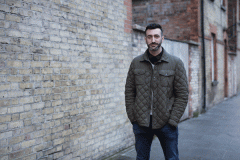The complexities of sex work
Toggle
Dr Paul Ryan has been lecturing at Maynooth University’s Department of Sociology for 10 years. He is a board member of Sex Workers Alliance Ireland. Much of his work has focused on LGBT issues, sex, and family from the 1960s and ‘70s. Now, his research has led him to an EU-funded project looking at sexuality and prostitution policy across 24 European countries.
“These are contentious issues,” he says. “Most academics do want a focus on harm reduction, but public policy in Ireland has moved towards a neo-abolitionist model, from a point where all sex work is seen as a violence against women and should be stamped out. The argument is that by ending demand, you end sex work, but it is aspirational and not backed up by evidence. Sweden has had this law since 1999 and it still has a thriving sex industry.”
It is this position, which, through a campaign called, “Turn Off the Red Light,” led Ireland to adopt a Nordic model in February 2017 that makes it a crime to purchase sex. The campaign was backed by Barnardos, the Irish Congress of Trade Unions and the Dublin Rape Crisis Centre. Two of the biggest drivers of the effort are the Immigrant Council of Ireland and Ruhama, an organisation that supports women affected by prostitution and trafficking.
Ireland went one step further than its northern neighbours, however, by increasing the penalties criminalising sex work itself. Is this a good idea? Will it work? These are the issues at the fore of Ryan’s research. Working with Dr Eílis Ward from NUI Galway, Ryan looked at the regulation of sex work in Ireland. Meanwhile, researchers in 23 other countries explored other models and evaluated what did and did not work. The aim is to gather enough data to compare and contrast different models.
“I am coming from a sex-positive feminist perspective, which says that people have the right to do what they want with their bodies. There are, of course, people who work in the sex industry who are exploited and want out. Middle-class women or men carrying out this work may have access to a whole range of resources and they’re not the greatest concern. But the question that needs to be asked is: Looking at different models, what is the best way to help the most marginalised? Criminalising the sale and purchase of sex work may push people away from services like health and the Gardaí.”
Ryan says that sex workers, whether male or female, do not always fit the stereotype of chaotic and abused, and that some people will dip in and out of sex work as a way of paying the bills or of buying what they want or need. Sometimes, sex work involves no more than a webcam and an internet connection. The image of the street worker is deeply embedded, but it is not always in touch with reality.
Ryan is concerned the law could have unintended consequences. “As the system now stands, there is not a lot of ‘street work.’ Sex is mostly sold indoors. Men buying it may now be reluctant to meet women in areas that are well-lit or well-recognised, and will move to darker, more remote locations, where the risk of violence is greater.
“There is a promise to review the legislation in two years, but there has not been an evaluation of existing or past policies around sex work, and no baseline studies exist on which to evaluate any change. We know little about the demographics of those who sell sex, almost nothing about male or transgender prostitution, and very little about clients and the relationship between the law and practices on the ground.”
Ryan adds that in Northern Ireland, the (governing) Democratic Unionist Party (DUP) brought forward a proposal making it a crime to purchase sex. As a member of an advisory group on a project commissioned by the Department of Justice and undertaken at Queen University Belfast to do a study the proposal, Ryan says they found the law to be largely unenforceable. The proposal ultimately became law anyway. So, Ryan asks, “Is it about real change, or sending out a message?”
He points to the religious origins of the Immigrant Council and Ruhama and suggests their position may be ideological. “Ireland has been wedded to the Swedish model for some time but, in Sweden, there was also an acknowledgement that prostitution is caused by structural inequalities, so there were incentives for people not to do it. Here, we are looking at taking income from some of the most deprived people, without offering them alternatives. For the model to work, we need to offer more support. We are not doing that. We have chosen to ignore advice from the United Nations, the World Health Organisation and various academics. I think this legislation could cause damage.”
Much of the debate, he says, has focused on women, but there are equally many men – mostly gay, but some straight – who sell sex to other men. “In the policy context, these men don’t exist. And yet, you can find them online, often casually exchanging sex for money or goods. Are they less vulnerable? Are they equally at risk of exploitation? There is an element of paternalism here, where it is seen that men always love sex and are doing well to make money from it, whereas a woman who has multiple sexual partners, whether for pleasure or money, is going against her nature and is being exploited.”
Men selling sex to other men is highly visible in the gay community, says Ryan. “Most of the men selling sex in Ireland are Brazilian or Venezuelan, perhaps because they are more anonymous than Irish men could be. Those I interviewed don’t always see themselves as sex workers, but see sex as a way to earn money. They dip in and out and few are exploited.”
Read more Spotlight on Research articles.
